Access to Health and Social Care Services in the UK Essay
VerifiedAdded on 2023/01/05
|7
|1904
|99
Essay
AI Summary
This essay explores the disparities in access to health and social care services within the UK, specifically focusing on the challenges faced by Black and minority ethnic (BME) populations. The essay highlights the importance of the health and social care sector in promoting independent and healthy living, and it acknowledges the increasing diversity of the UK population. It examines how factors such as ethnicity, cultural differences, linguistic competence, and socioeconomic status contribute to barriers in accessing equitable care. The essay discusses discrimination, barriers to services, and the need to address health gaps within ethnic minority groups. It emphasizes the importance of timely, relevant, and sensitive care, along with equal access to information and services, to ensure equitable outcomes. The essay concludes by summarizing the key findings and emphasizing the need for provisions, laws, and measures to improve care for BME populations, aiming to reduce morbidity and improve health outcomes. The essay also references several studies and journals to support its arguments.

Introduction to Health and Social Care
Paraphrase This Document
Need a fresh take? Get an instant paraphrase of this document with our AI Paraphraser

TABLE OF CONTENTS
ESSAY.............................................................................................................................................1
REFERENCES................................................................................................................................5
ESSAY.............................................................................................................................................1
REFERENCES................................................................................................................................5
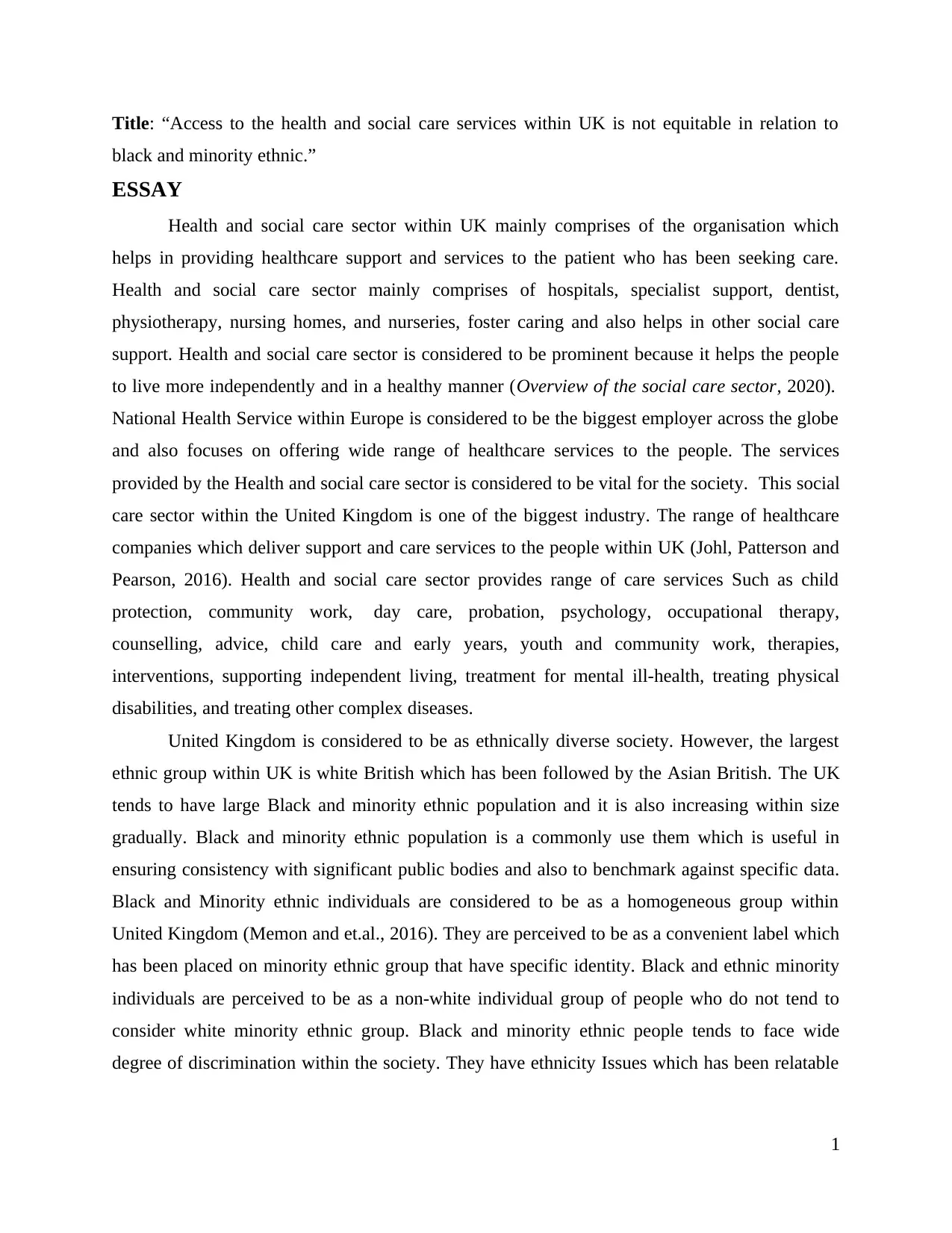
Title: “Access to the health and social care services within UK is not equitable in relation to
black and minority ethnic.”
ESSAY
Health and social care sector within UK mainly comprises of the organisation which
helps in providing healthcare support and services to the patient who has been seeking care.
Health and social care sector mainly comprises of hospitals, specialist support, dentist,
physiotherapy, nursing homes, and nurseries, foster caring and also helps in other social care
support. Health and social care sector is considered to be prominent because it helps the people
to live more independently and in a healthy manner (Overview of the social care sector, 2020).
National Health Service within Europe is considered to be the biggest employer across the globe
and also focuses on offering wide range of healthcare services to the people. The services
provided by the Health and social care sector is considered to be vital for the society. This social
care sector within the United Kingdom is one of the biggest industry. The range of healthcare
companies which deliver support and care services to the people within UK (Johl, Patterson and
Pearson, 2016). Health and social care sector provides range of care services Such as child
protection, community work, day care, probation, psychology, occupational therapy,
counselling, advice, child care and early years, youth and community work, therapies,
interventions, supporting independent living, treatment for mental ill-health, treating physical
disabilities, and treating other complex diseases.
United Kingdom is considered to be as ethnically diverse society. However, the largest
ethnic group within UK is white British which has been followed by the Asian British. The UK
tends to have large Black and minority ethnic population and it is also increasing within size
gradually. Black and minority ethnic population is a commonly use them which is useful in
ensuring consistency with significant public bodies and also to benchmark against specific data.
Black and Minority ethnic individuals are considered to be as a homogeneous group within
United Kingdom (Memon and et.al., 2016). They are perceived to be as a convenient label which
has been placed on minority ethnic group that have specific identity. Black and ethnic minority
individuals are perceived to be as a non-white individual group of people who do not tend to
consider white minority ethnic group. Black and minority ethnic people tends to face wide
degree of discrimination within the society. They have ethnicity Issues which has been relatable
1
black and minority ethnic.”
ESSAY
Health and social care sector within UK mainly comprises of the organisation which
helps in providing healthcare support and services to the patient who has been seeking care.
Health and social care sector mainly comprises of hospitals, specialist support, dentist,
physiotherapy, nursing homes, and nurseries, foster caring and also helps in other social care
support. Health and social care sector is considered to be prominent because it helps the people
to live more independently and in a healthy manner (Overview of the social care sector, 2020).
National Health Service within Europe is considered to be the biggest employer across the globe
and also focuses on offering wide range of healthcare services to the people. The services
provided by the Health and social care sector is considered to be vital for the society. This social
care sector within the United Kingdom is one of the biggest industry. The range of healthcare
companies which deliver support and care services to the people within UK (Johl, Patterson and
Pearson, 2016). Health and social care sector provides range of care services Such as child
protection, community work, day care, probation, psychology, occupational therapy,
counselling, advice, child care and early years, youth and community work, therapies,
interventions, supporting independent living, treatment for mental ill-health, treating physical
disabilities, and treating other complex diseases.
United Kingdom is considered to be as ethnically diverse society. However, the largest
ethnic group within UK is white British which has been followed by the Asian British. The UK
tends to have large Black and minority ethnic population and it is also increasing within size
gradually. Black and minority ethnic population is a commonly use them which is useful in
ensuring consistency with significant public bodies and also to benchmark against specific data.
Black and Minority ethnic individuals are considered to be as a homogeneous group within
United Kingdom (Memon and et.al., 2016). They are perceived to be as a convenient label which
has been placed on minority ethnic group that have specific identity. Black and ethnic minority
individuals are perceived to be as a non-white individual group of people who do not tend to
consider white minority ethnic group. Black and minority ethnic people tends to face wide
degree of discrimination within the society. They have ethnicity Issues which has been relatable
1
⊘ This is a preview!⊘
Do you want full access?
Subscribe today to unlock all pages.

Trusted by 1+ million students worldwide
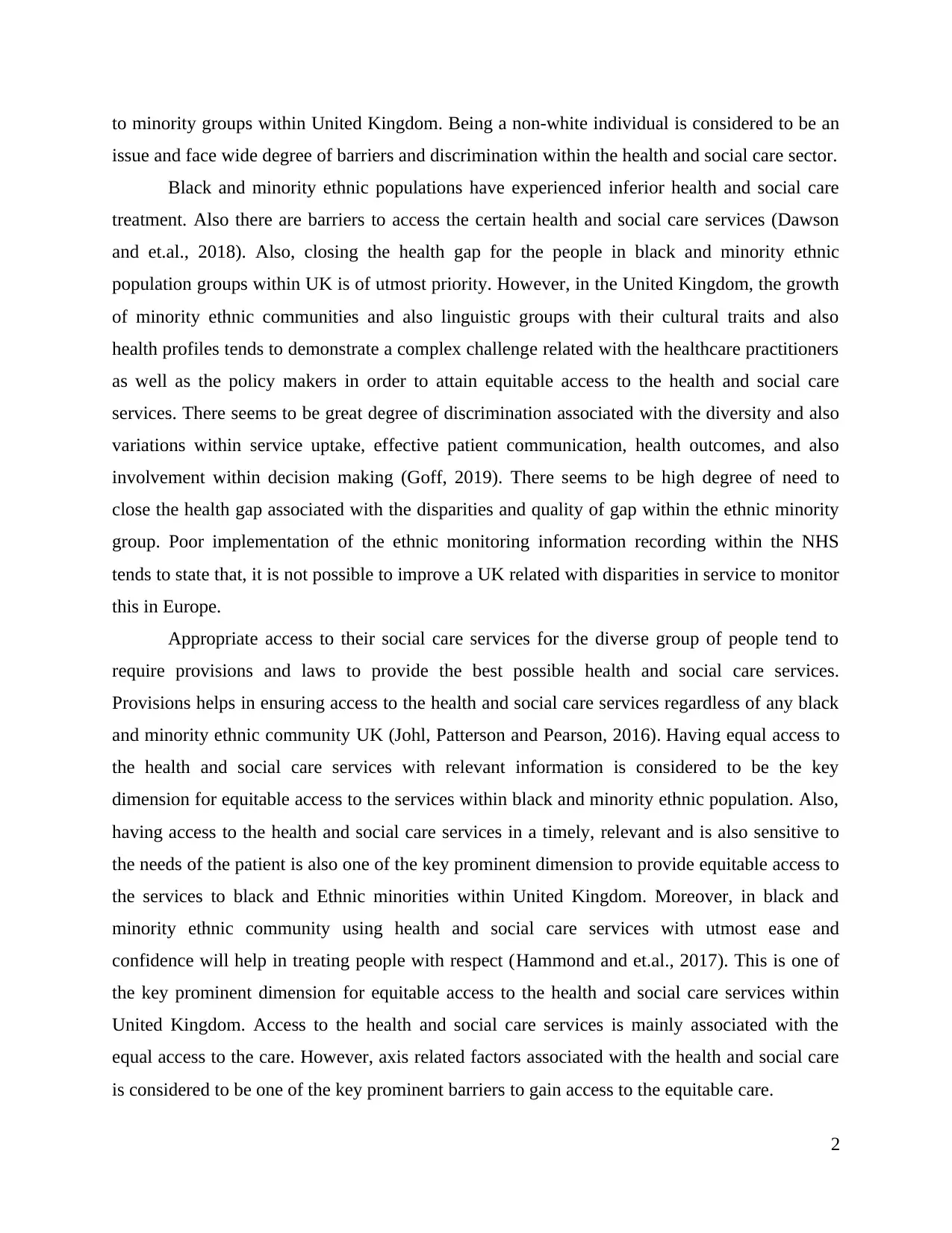
to minority groups within United Kingdom. Being a non-white individual is considered to be an
issue and face wide degree of barriers and discrimination within the health and social care sector.
Black and minority ethnic populations have experienced inferior health and social care
treatment. Also there are barriers to access the certain health and social care services (Dawson
and et.al., 2018). Also, closing the health gap for the people in black and minority ethnic
population groups within UK is of utmost priority. However, in the United Kingdom, the growth
of minority ethnic communities and also linguistic groups with their cultural traits and also
health profiles tends to demonstrate a complex challenge related with the healthcare practitioners
as well as the policy makers in order to attain equitable access to the health and social care
services. There seems to be great degree of discrimination associated with the diversity and also
variations within service uptake, effective patient communication, health outcomes, and also
involvement within decision making (Goff, 2019). There seems to be high degree of need to
close the health gap associated with the disparities and quality of gap within the ethnic minority
group. Poor implementation of the ethnic monitoring information recording within the NHS
tends to state that, it is not possible to improve a UK related with disparities in service to monitor
this in Europe.
Appropriate access to their social care services for the diverse group of people tend to
require provisions and laws to provide the best possible health and social care services.
Provisions helps in ensuring access to the health and social care services regardless of any black
and minority ethnic community UK (Johl, Patterson and Pearson, 2016). Having equal access to
the health and social care services with relevant information is considered to be the key
dimension for equitable access to the services within black and minority ethnic population. Also,
having access to the health and social care services in a timely, relevant and is also sensitive to
the needs of the patient is also one of the key prominent dimension to provide equitable access to
the services to black and Ethnic minorities within United Kingdom. Moreover, in black and
minority ethnic community using health and social care services with utmost ease and
confidence will help in treating people with respect (Hammond and et.al., 2017). This is one of
the key prominent dimension for equitable access to the health and social care services within
United Kingdom. Access to the health and social care services is mainly associated with the
equal access to the care. However, axis related factors associated with the health and social care
is considered to be one of the key prominent barriers to gain access to the equitable care.
2
issue and face wide degree of barriers and discrimination within the health and social care sector.
Black and minority ethnic populations have experienced inferior health and social care
treatment. Also there are barriers to access the certain health and social care services (Dawson
and et.al., 2018). Also, closing the health gap for the people in black and minority ethnic
population groups within UK is of utmost priority. However, in the United Kingdom, the growth
of minority ethnic communities and also linguistic groups with their cultural traits and also
health profiles tends to demonstrate a complex challenge related with the healthcare practitioners
as well as the policy makers in order to attain equitable access to the health and social care
services. There seems to be great degree of discrimination associated with the diversity and also
variations within service uptake, effective patient communication, health outcomes, and also
involvement within decision making (Goff, 2019). There seems to be high degree of need to
close the health gap associated with the disparities and quality of gap within the ethnic minority
group. Poor implementation of the ethnic monitoring information recording within the NHS
tends to state that, it is not possible to improve a UK related with disparities in service to monitor
this in Europe.
Appropriate access to their social care services for the diverse group of people tend to
require provisions and laws to provide the best possible health and social care services.
Provisions helps in ensuring access to the health and social care services regardless of any black
and minority ethnic community UK (Johl, Patterson and Pearson, 2016). Having equal access to
the health and social care services with relevant information is considered to be the key
dimension for equitable access to the services within black and minority ethnic population. Also,
having access to the health and social care services in a timely, relevant and is also sensitive to
the needs of the patient is also one of the key prominent dimension to provide equitable access to
the services to black and Ethnic minorities within United Kingdom. Moreover, in black and
minority ethnic community using health and social care services with utmost ease and
confidence will help in treating people with respect (Hammond and et.al., 2017). This is one of
the key prominent dimension for equitable access to the health and social care services within
United Kingdom. Access to the health and social care services is mainly associated with the
equal access to the care. However, axis related factors associated with the health and social care
is considered to be one of the key prominent barriers to gain access to the equitable care.
2
Paraphrase This Document
Need a fresh take? Get an instant paraphrase of this document with our AI Paraphraser
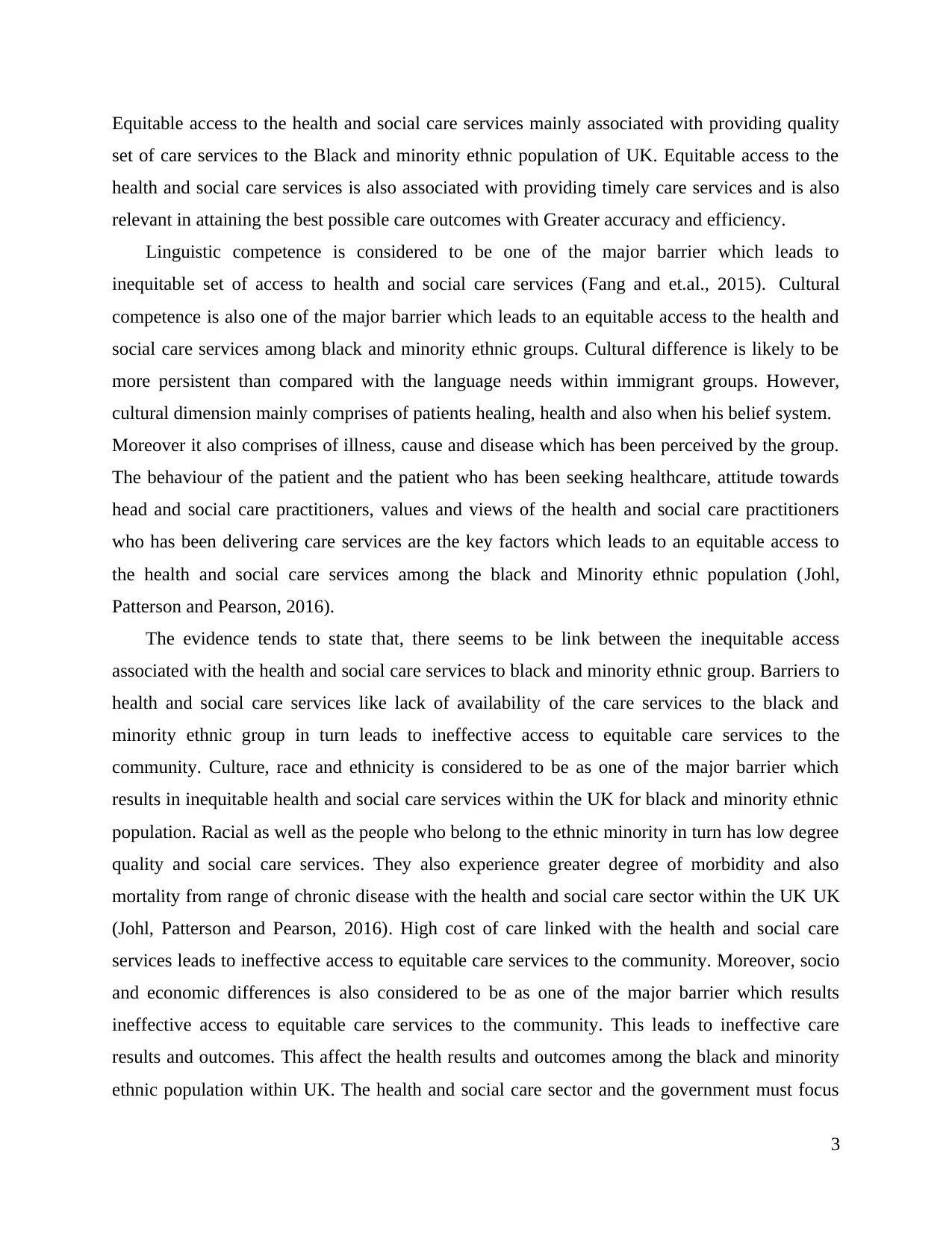
Equitable access to the health and social care services mainly associated with providing quality
set of care services to the Black and minority ethnic population of UK. Equitable access to the
health and social care services is also associated with providing timely care services and is also
relevant in attaining the best possible care outcomes with Greater accuracy and efficiency.
Linguistic competence is considered to be one of the major barrier which leads to
inequitable set of access to health and social care services (Fang and et.al., 2015). Cultural
competence is also one of the major barrier which leads to an equitable access to the health and
social care services among black and minority ethnic groups. Cultural difference is likely to be
more persistent than compared with the language needs within immigrant groups. However,
cultural dimension mainly comprises of patients healing, health and also when his belief system.
Moreover it also comprises of illness, cause and disease which has been perceived by the group.
The behaviour of the patient and the patient who has been seeking healthcare, attitude towards
head and social care practitioners, values and views of the health and social care practitioners
who has been delivering care services are the key factors which leads to an equitable access to
the health and social care services among the black and Minority ethnic population (Johl,
Patterson and Pearson, 2016).
The evidence tends to state that, there seems to be link between the inequitable access
associated with the health and social care services to black and minority ethnic group. Barriers to
health and social care services like lack of availability of the care services to the black and
minority ethnic group in turn leads to ineffective access to equitable care services to the
community. Culture, race and ethnicity is considered to be as one of the major barrier which
results in inequitable health and social care services within the UK for black and minority ethnic
population. Racial as well as the people who belong to the ethnic minority in turn has low degree
quality and social care services. They also experience greater degree of morbidity and also
mortality from range of chronic disease with the health and social care sector within the UK UK
(Johl, Patterson and Pearson, 2016). High cost of care linked with the health and social care
services leads to ineffective access to equitable care services to the community. Moreover, socio
and economic differences is also considered to be as one of the major barrier which results
ineffective access to equitable care services to the community. This leads to ineffective care
results and outcomes. This affect the health results and outcomes among the black and minority
ethnic population within UK. The health and social care sector and the government must focus
3
set of care services to the Black and minority ethnic population of UK. Equitable access to the
health and social care services is also associated with providing timely care services and is also
relevant in attaining the best possible care outcomes with Greater accuracy and efficiency.
Linguistic competence is considered to be one of the major barrier which leads to
inequitable set of access to health and social care services (Fang and et.al., 2015). Cultural
competence is also one of the major barrier which leads to an equitable access to the health and
social care services among black and minority ethnic groups. Cultural difference is likely to be
more persistent than compared with the language needs within immigrant groups. However,
cultural dimension mainly comprises of patients healing, health and also when his belief system.
Moreover it also comprises of illness, cause and disease which has been perceived by the group.
The behaviour of the patient and the patient who has been seeking healthcare, attitude towards
head and social care practitioners, values and views of the health and social care practitioners
who has been delivering care services are the key factors which leads to an equitable access to
the health and social care services among the black and Minority ethnic population (Johl,
Patterson and Pearson, 2016).
The evidence tends to state that, there seems to be link between the inequitable access
associated with the health and social care services to black and minority ethnic group. Barriers to
health and social care services like lack of availability of the care services to the black and
minority ethnic group in turn leads to ineffective access to equitable care services to the
community. Culture, race and ethnicity is considered to be as one of the major barrier which
results in inequitable health and social care services within the UK for black and minority ethnic
population. Racial as well as the people who belong to the ethnic minority in turn has low degree
quality and social care services. They also experience greater degree of morbidity and also
mortality from range of chronic disease with the health and social care sector within the UK UK
(Johl, Patterson and Pearson, 2016). High cost of care linked with the health and social care
services leads to ineffective access to equitable care services to the community. Moreover, socio
and economic differences is also considered to be as one of the major barrier which results
ineffective access to equitable care services to the community. This leads to ineffective care
results and outcomes. This affect the health results and outcomes among the black and minority
ethnic population within UK. The health and social care sector and the government must focus
3
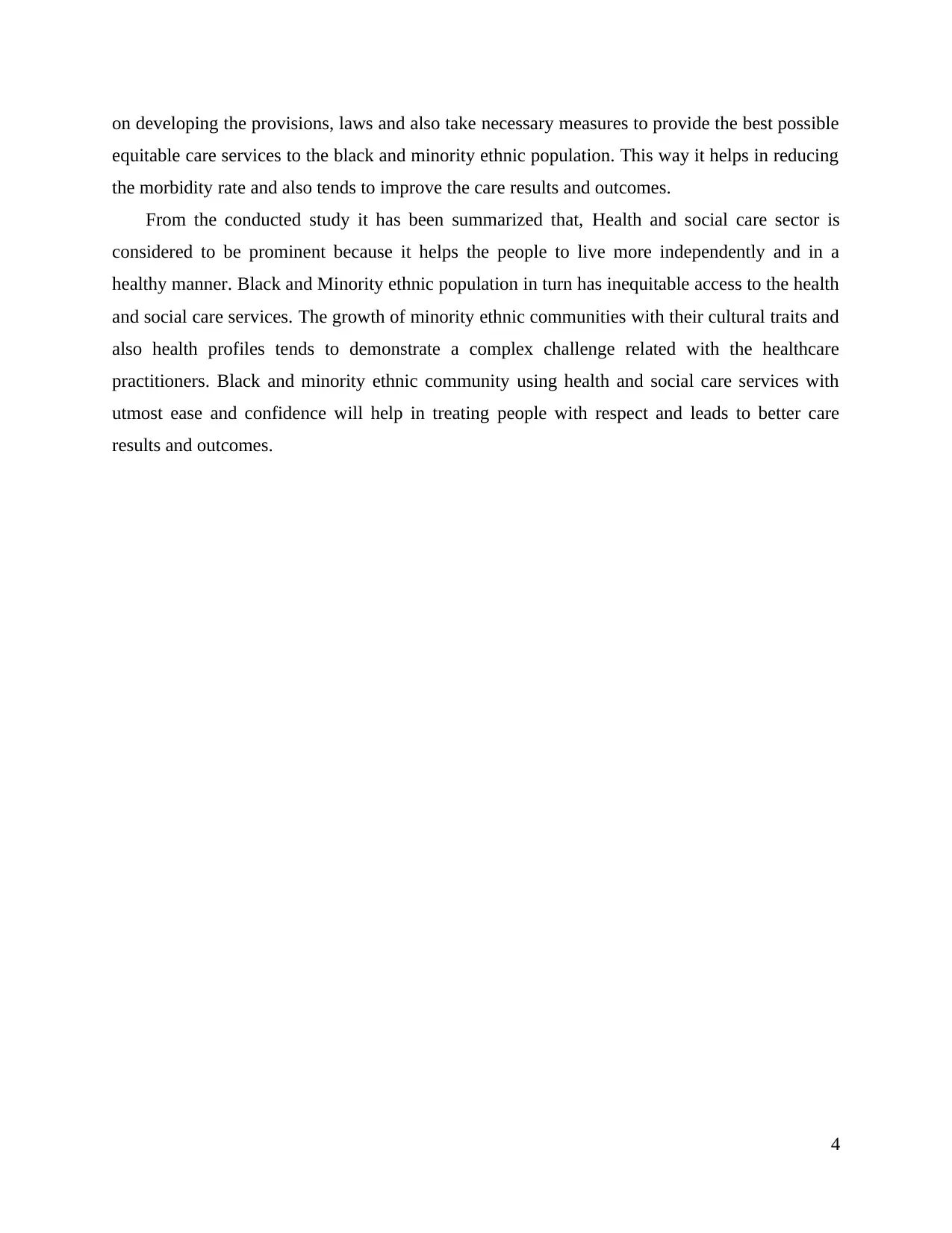
on developing the provisions, laws and also take necessary measures to provide the best possible
equitable care services to the black and minority ethnic population. This way it helps in reducing
the morbidity rate and also tends to improve the care results and outcomes.
From the conducted study it has been summarized that, Health and social care sector is
considered to be prominent because it helps the people to live more independently and in a
healthy manner. Black and Minority ethnic population in turn has inequitable access to the health
and social care services. The growth of minority ethnic communities with their cultural traits and
also health profiles tends to demonstrate a complex challenge related with the healthcare
practitioners. Black and minority ethnic community using health and social care services with
utmost ease and confidence will help in treating people with respect and leads to better care
results and outcomes.
4
equitable care services to the black and minority ethnic population. This way it helps in reducing
the morbidity rate and also tends to improve the care results and outcomes.
From the conducted study it has been summarized that, Health and social care sector is
considered to be prominent because it helps the people to live more independently and in a
healthy manner. Black and Minority ethnic population in turn has inequitable access to the health
and social care services. The growth of minority ethnic communities with their cultural traits and
also health profiles tends to demonstrate a complex challenge related with the healthcare
practitioners. Black and minority ethnic community using health and social care services with
utmost ease and confidence will help in treating people with respect and leads to better care
results and outcomes.
4
⊘ This is a preview!⊘
Do you want full access?
Subscribe today to unlock all pages.

Trusted by 1+ million students worldwide
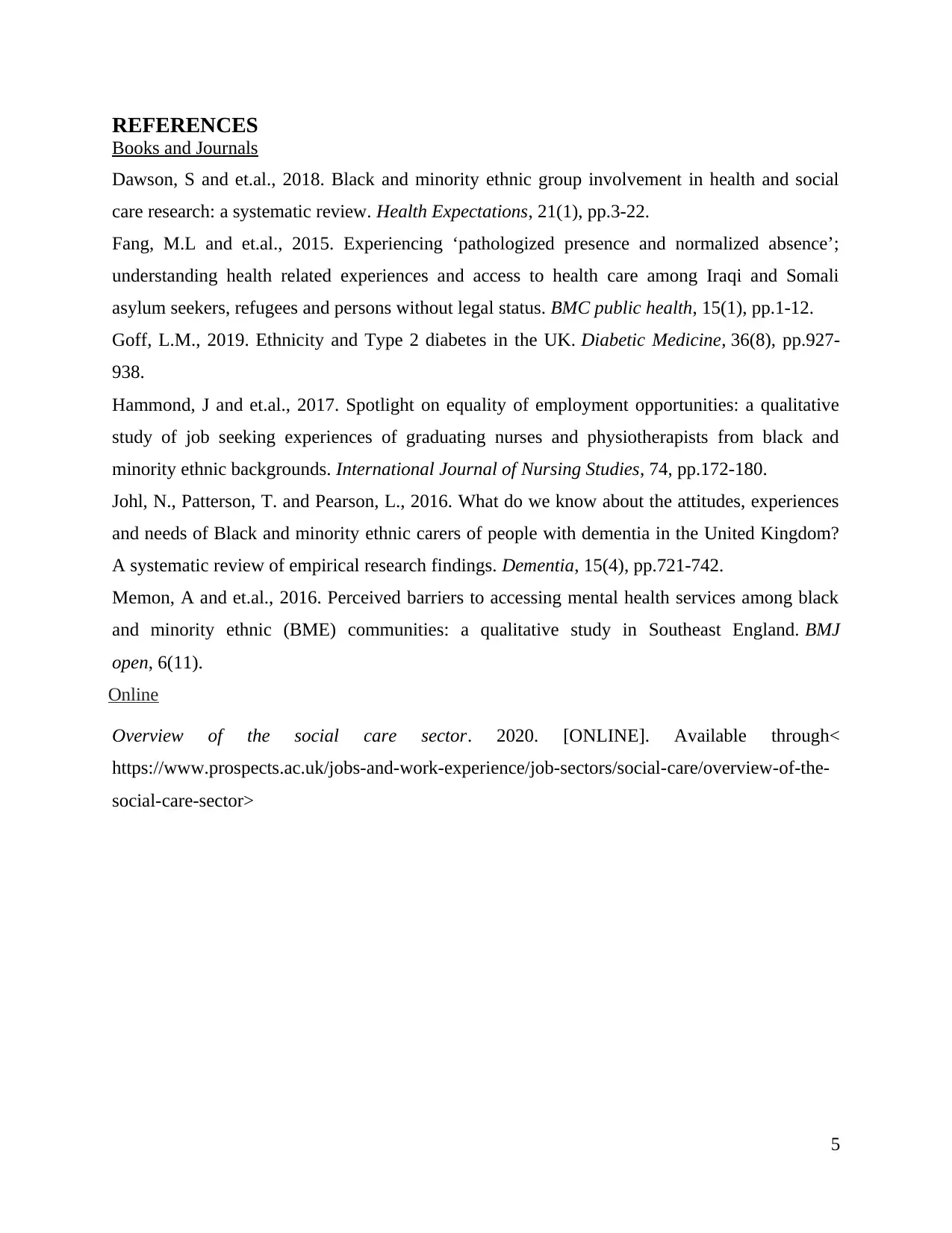
REFERENCES
Books and Journals
Dawson, S and et.al., 2018. Black and minority ethnic group involvement in health and social
care research: a systematic review. Health Expectations, 21(1), pp.3-22.
Fang, M.L and et.al., 2015. Experiencing ‘pathologized presence and normalized absence’;
understanding health related experiences and access to health care among Iraqi and Somali
asylum seekers, refugees and persons without legal status. BMC public health, 15(1), pp.1-12.
Goff, L.M., 2019. Ethnicity and Type 2 diabetes in the UK. Diabetic Medicine, 36(8), pp.927-
938.
Hammond, J and et.al., 2017. Spotlight on equality of employment opportunities: a qualitative
study of job seeking experiences of graduating nurses and physiotherapists from black and
minority ethnic backgrounds. International Journal of Nursing Studies, 74, pp.172-180.
Johl, N., Patterson, T. and Pearson, L., 2016. What do we know about the attitudes, experiences
and needs of Black and minority ethnic carers of people with dementia in the United Kingdom?
A systematic review of empirical research findings. Dementia, 15(4), pp.721-742.
Memon, A and et.al., 2016. Perceived barriers to accessing mental health services among black
and minority ethnic (BME) communities: a qualitative study in Southeast England. BMJ
open, 6(11).
Online
Overview of the social care sector. 2020. [ONLINE]. Available through<
https://www.prospects.ac.uk/jobs-and-work-experience/job-sectors/social-care/overview-of-the-
social-care-sector>
5
Books and Journals
Dawson, S and et.al., 2018. Black and minority ethnic group involvement in health and social
care research: a systematic review. Health Expectations, 21(1), pp.3-22.
Fang, M.L and et.al., 2015. Experiencing ‘pathologized presence and normalized absence’;
understanding health related experiences and access to health care among Iraqi and Somali
asylum seekers, refugees and persons without legal status. BMC public health, 15(1), pp.1-12.
Goff, L.M., 2019. Ethnicity and Type 2 diabetes in the UK. Diabetic Medicine, 36(8), pp.927-
938.
Hammond, J and et.al., 2017. Spotlight on equality of employment opportunities: a qualitative
study of job seeking experiences of graduating nurses and physiotherapists from black and
minority ethnic backgrounds. International Journal of Nursing Studies, 74, pp.172-180.
Johl, N., Patterson, T. and Pearson, L., 2016. What do we know about the attitudes, experiences
and needs of Black and minority ethnic carers of people with dementia in the United Kingdom?
A systematic review of empirical research findings. Dementia, 15(4), pp.721-742.
Memon, A and et.al., 2016. Perceived barriers to accessing mental health services among black
and minority ethnic (BME) communities: a qualitative study in Southeast England. BMJ
open, 6(11).
Online
Overview of the social care sector. 2020. [ONLINE]. Available through<
https://www.prospects.ac.uk/jobs-and-work-experience/job-sectors/social-care/overview-of-the-
social-care-sector>
5
1 out of 7
Related Documents
Your All-in-One AI-Powered Toolkit for Academic Success.
+13062052269
info@desklib.com
Available 24*7 on WhatsApp / Email
![[object Object]](/_next/static/media/star-bottom.7253800d.svg)
Unlock your academic potential
Copyright © 2020–2026 A2Z Services. All Rights Reserved. Developed and managed by ZUCOL.





